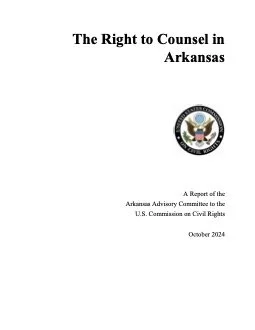By Sixth Amendment Center and The Defender Initiative
In 1963, the U.S. Supreme Court declared in Gideon v. Wainwright that it is an “obvious truth” that anyone accused of a crime who cannot afford the cost of a lawyer “cannot be assured a fair trial unless counsel is provided for him.” In the intervening 58 years, the U.S. Supreme Court has clarified that the Sixth Amendment right to counsel means every person who is accused of a crime is entitled to have an attorney provided at government expense to defend him in all federal and state courts whenever that person is facing the potential loss of his liberty and is unable to afford his own attorney. Moreover, the appointed lawyer needs to be more than merely a warm body with a bar card. The attorney must also be effective, the U.S. Supreme Court said again in United States v. Cronic in 1984, subjecting the prosecution’s case to “the crucible of meaningful adversarial testing.” Under Gideon, the Sixth Amendment right to effective counsel is an obligation of the states under the due process clause of the Fourteenth Amendment. The State of Illinois delegates to its county boards and circuit court judges most of its constitutional obligation to ensure the provision of effective assistance of counsel to indigent criminal defendants in the trial courts. Yet the state does not have any oversight structure by which to know whether each county’s indigent defense system has a sufficient number of attorneys with the necessary time, training, and resources to provide effective assistance of counsel at every critical stage of a criminal case for each and every indigent defendant. This is the first of three findings of this report. As explained in chapter I, this report is the result of a statewide evaluation of the provision of the right to counsel in adult criminal cases at the trial level, conducted at the request of the Illinois Supreme Court. Through data collection and analysis, interviews with criminal justice stakeholders, and courtroom observations, the evaluation assessed indigent defense services against national standards and Sixth Amendment caselaw that establish the hallmarks of a structurally sound indigent representation system, which include the early appointment of qualified and trained attorneys, who have sufficient time and resources to provide effective representation under independent supervision. The absence of any of these factors can show that a system is presumptively providing ineffective assistance of counsel. This evaluation focuses closely on the practices of nine counties – Champaign, Cook, DuPage, Gallatin, Hardin, LaSalle, Mercer, Schuyler, and Stephenson – which taken together illustrate the wide variations among Illinois county governments and courts in their efforts to fulfill the Sixth Amendment right to counsel. The State of Illinois delegates to its counties and trial court judges the responsibility for providing and overseeing attorneys to effectively represent indigent defendants, and it delegates to its counties nearly all of the responsibility for funding the right to counsel of indigent defendants. When a state chooses to delegate its federal constitutional responsibilities to its local governments and courts, the state must guarantee not only that these local bodies are capable of providing effective representation but also that they are in fact doing so. Yet Illinois is one of just seven states that do not have any state commission, state agency, or state officer with oversight of any aspect of trial-level indigent representation services in adult criminal cases. Chapter II details the framework that Illinois has established for its county-level criminal justice systems and how that framework has been implemented in the nine sample counties. The indigent defense systems in the nine representative counties of this evaluation vary greatly. With 102 counties in the state, it is likely that any or all of those counties present even greater variations in their indigent defense systems. Without oversight, the State of Illinois cannot accurately say how many people or cases, and of what case types, require appointed counsel nor by whom the representation is being provided, if at all, and the State of Illinois cannot know how much the provision of indigent representation should cost nor how to provide it effectively in all 102 counties. Instead, policy decisions about indigent defense systems are left to anecdote, speculation, and potentially even bias. Chapters III through VII comprise the substantive assessment, which relate the basis of our second and third findings: The state’s limited framework for how county boards and circuit court judges are to establish and implement the indigent defense system in each county institutionalizes political and judicial interference with the appointed attorneys’ independence to act in the stated legal interests of their indigent clients. This lack of independence causes systemic conflicts of interest that interfere with the provision of effective assistance of counsel. 3. The indigent defense systems established in Illinois’ counties lack oversight and accountability that can result in a constructive denial of the right to counsel to at least some indigent defendants, and in some instances can result in the actual denial of the right to counsel to at least some indigent defendants. An indigent defense system’s effectiveness must be measured by the representation it provides to its appointed clients. The U.S. Supreme Court explained in Cronic that “[t]he right to the effective assistance of counsel” means that the defense must put the prosecution’s case through the “crucible of meaningful adversarial testing.” For this to occur, U.S. Supreme Court case law provides that an indigent person must be represented by a qualified and trained attorney, who is appointed early in the case, and who has sufficient time and resources to provide effective representation under independent supervision.
Boston: Sixth Amendment Center, 2021. 181p.
















